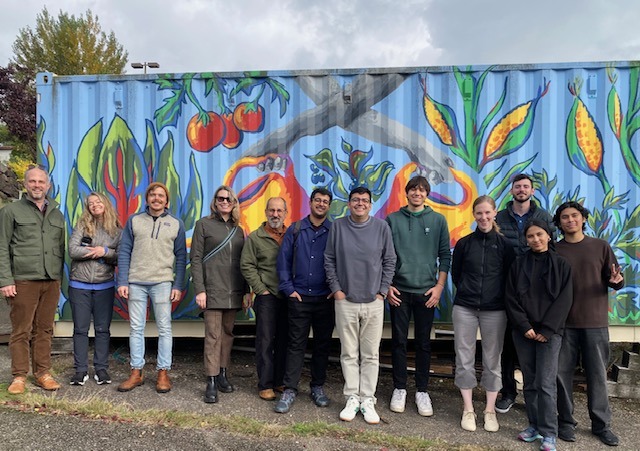Published on November 1, 2024

What do Microforests, the historic University of Tacoma campus, refugee resettlement, greenwater recycling, everything bagels and tasty Thai food have in common? They all played a part in October’s Research to Action teams retreat, led by Urban@UW.
Urban@UW brings together multidisciplinary academics and embedded community leaders to solve complex urban challenges through the Research to Action Collaboratory. Teams in the Collaboratory are given seed funding as well as project management training at quarterly workshops and an annual retreat. This year the 2024-25 cohort includes:
- Strengthening Green Stormwater Infrastructure Through Community Initiatives. Refugee resettlement professionals from World Relief Western Washington maintain Paradise Plots, a community garden for refugees. In partnership with faculty from UW’s School of Environmental and Forest Science, they are quantifying stormwater recovered through the garden’s extensive green water recycling program.
- Creating an Urban Microforest and UW Tacoma. With the goal of increasing Tacoma’s tree canopy, reducing the heat island effect, and creating a public memory site for Japanese and Indigenous people who came before, faculty from UW Tacoma’s Culture, Arts and Communication division and School of Engineering and Technology are partnering with Tacoma Tree Foundation and the Urban Forestry program at the City of Tacoma to create a microforest.
The retreat began on the University of Tacoma campus, where each team updated us on their progress (and we noshed on everything bagels). Then we toured the microforest site. Next we broke for Thai food at a restaurant in Kent, and then traveled to the community garden site. There we learned about the green water recycling project.
The day ended with RAC co-director Jen Davison teaching the group about Deep Democracy and the DIVE model of Deep Curiosity. RAC teams, along with Urban@UW Director Rachel Berney and Program Manager Kate Landis, broke into small groups to role-play a situation in which there was conflict and used the new tools to transform that conflict.
The RAC teams will gather again in the winter quarter for a workshop and will enjoy a multi-day retreat next spring. The Urban@UW team are in touch with the teams on a regular basis to help them troubleshot challenges and share resources.
Urban@UW brings together multidisciplinary academics and embedded community leaders to solve complex urban challenges through the Research to Action Collaboratory.